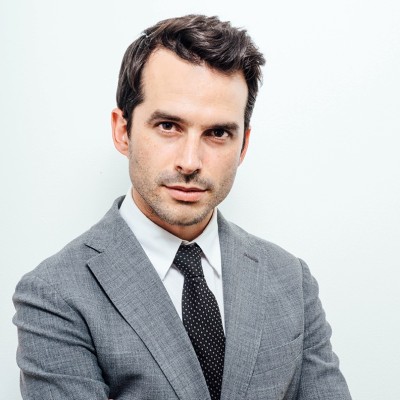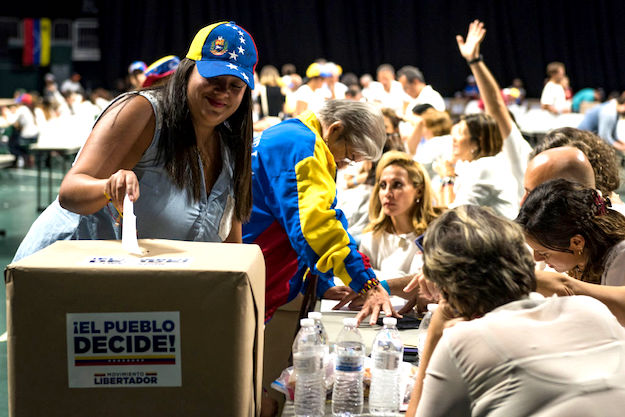On Sunday, July 16 more than 7 million Venezuelans – at home and abroad – participated in a symbolic referendum against the constitutional convention proposed by President Nicolás Maduro. I was one of the votes from abroad. Besides casting my ballot, I also volunteered to accompany observers witnessing the process in New York City. We started by visiting the voting centers in Manhattan, where turnout was predictably high. The borough has been a focal point for the Venezuelan diaspora, with regular demonstrations against the Maduro regime. But when we got to Queens, I saw lines that went around the block, with people waiting over two hours to cast their ballots. Social media showed this was happening in Madrid, Bogotá, and Lima. Venezuelans were turning up en masse.
At the end of the day, the diaspora cast nearly one of 10 votes. Without them, participants would not have surpassed 7 million, a threshold the opposition wanted to cross to show their capacity to mobilize voters, even outside an official election. But Sunday’s vote did more than show Venezuelans’ rejection of Maduro. It unified the Venezuelan diaspora, which has grown rapidly under Chavismo, around a common goal. It revealed their numbers and testified to their resolve. Now it is time for leaders of the community abroad to tap into that power and put it to work, pushing for the change their votes showed they overwhelmingly support.
This momentum has been growing steadily. The last time Venezuelans abroad voted was in the 2013 presidential elections, since Venezuelans cannot vote in legislative elections while outside the country. In that race, they overwhelmingly supported Henrique Capriles, former governor of Miranda state, with 93 percent of the vote. Maduro got 6 percent of the total of 59,749 votes from abroad. But Sunday’s vote showed a twelve-fold increase in participants. Of course, it did not require voters to be registered. However, more than 700,000 people cast a ballot. This represents an important shift in the country’s electoral composition. With more than 2 million Venezuelans living abroad, the diaspora population is now smaller only than that of Zulia and Miranda, two of Venezuela’s most electorally-contested states, where governors are near automatic presidential candidates. With numbers like this, Venezuelans abroad have suddenly become a constituency essential to any Venezuelan politician in future national election.
Venezuelan politicians are not the only ones courting Venezuelan immigrants. In South Florida, the epicenter of the Venezuelan community abroad, over one hundred thousand voters participated in Sunday’s referendum. State leaders had already noticed the emergence of this bloc. Last week, Governor Rick Scott denounced Maduro and demanded freedom for the country’s political prisoners during a political rally in Doral. He also plans to ban the state from doing business with organizations that work with the Maduro government. South Florida Congresswoman Ileana Ros-Lehtinen visited a voting center during Sunday’s referendum and appeared next to Carlos Vecchio, a senior leader of one of the opposition’s main parties, Voluntad Popular.
Senator Marco Rubio also has close ties to the Venezuelan community in his state. In April, Marcos Coello, who was tried for allegedly conspiring with jailed opposition leader Leopoldo López, was arrested by Immigration and Customs Enforcement while seeking asylum. As the news spread among Venezuelan social media circles that Coello was facing deportation, Rubio quickly stepped in and called White House Chief of Staff Reince Priebus. The issue was promptly resolved.
With their new influence, Venezuelans living abroad can be an important voice for those suffering at home from lack of medicine and food. If those who voted last Sunday dedicate the same level of energy and commitment to engage key leaders and organizations in their adopted countries, raising awareness of their home country’s humanitarian crisis and of the urgent need for aid, much could be achieved. Many of the institutions that could provide relief are in the diaspora’s adopted cities, such as the U.N. in New York. This person-to-person engagement can help overcome the hurdles imposed by Venezuelan government’s refusal to concede the humanitarian crisis is real and thus accept any aid.
Venezuelans abroad had already voted once – with their feet – when they uprooted their lives, lost their businesses, broke up their families, abandoned their jobs and their homes because of the country’s collapse and their opposition to the Maduro regime. On Sunday, they voted again. Being forced to emigrate is never a positive story. But even away from home, this population can find a new role as ambassadors for those fighting at home. They can be a force for democracy and development. The hundreds of thousands of votes they cast showed their potential. The next step – action – is vital. Millions are depending on it.
—
Zubillaga is a senior director at AS/COA, where he leads the Venezuela Working Group









